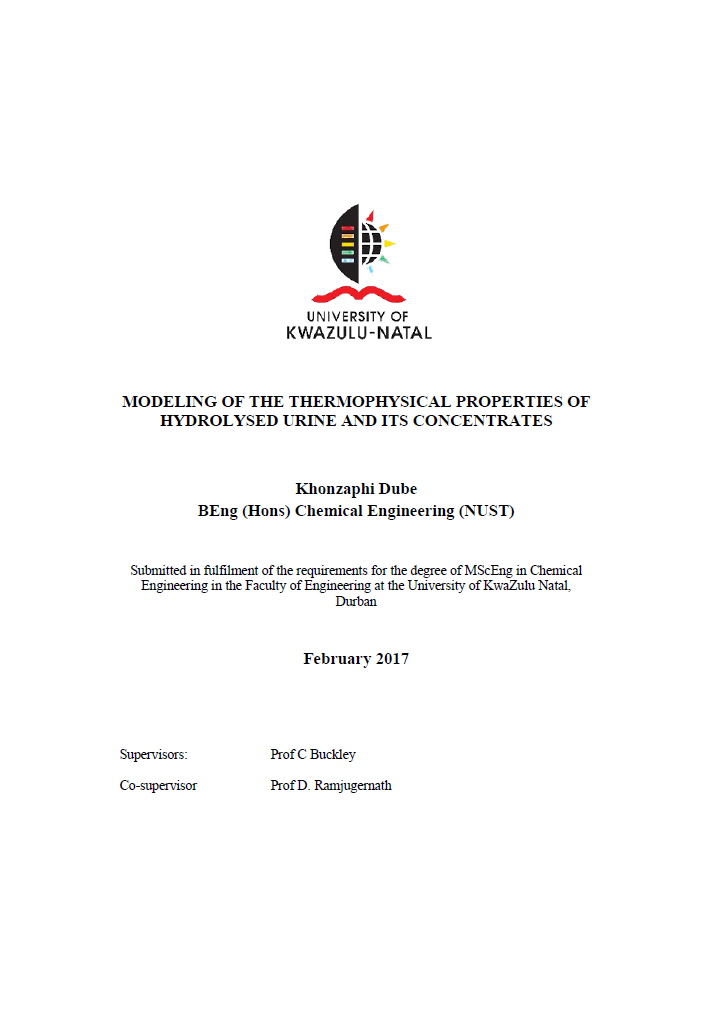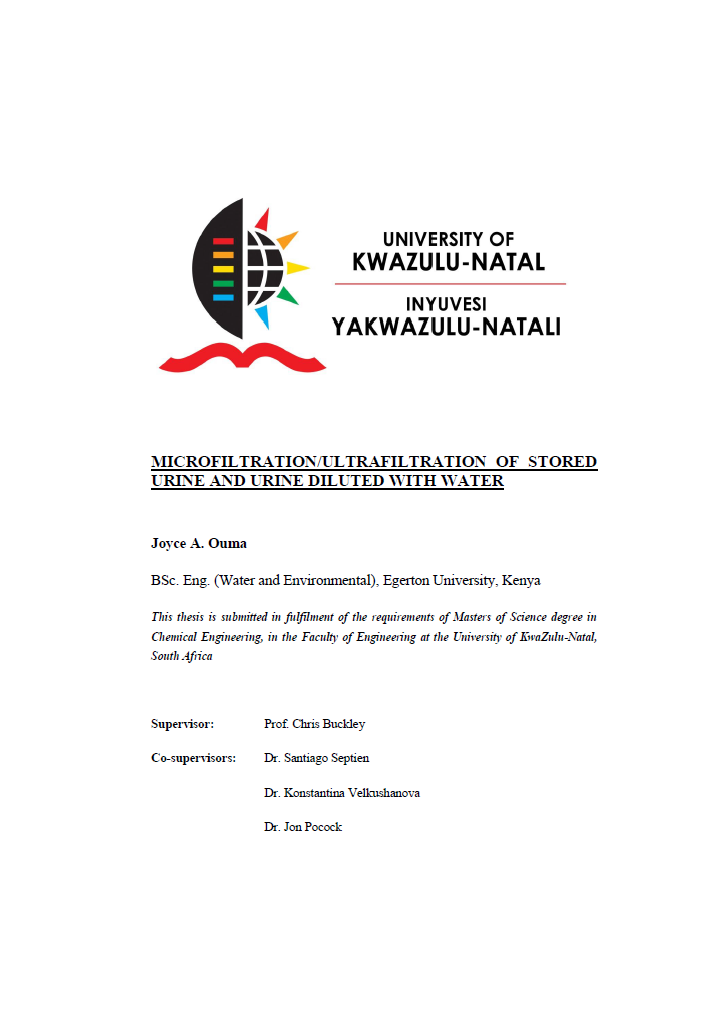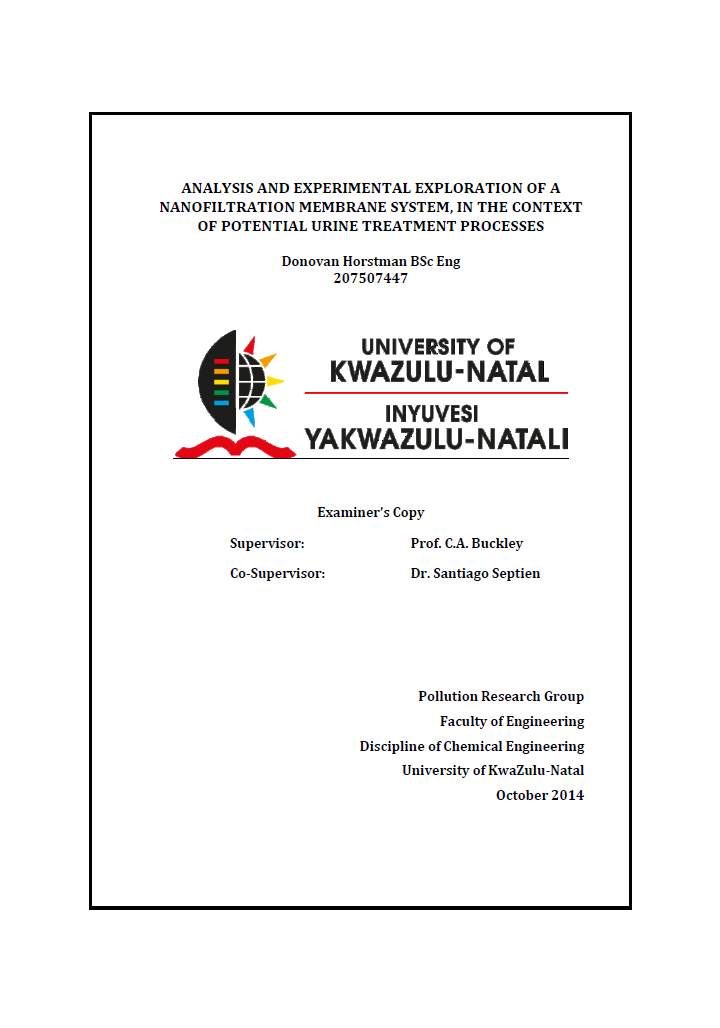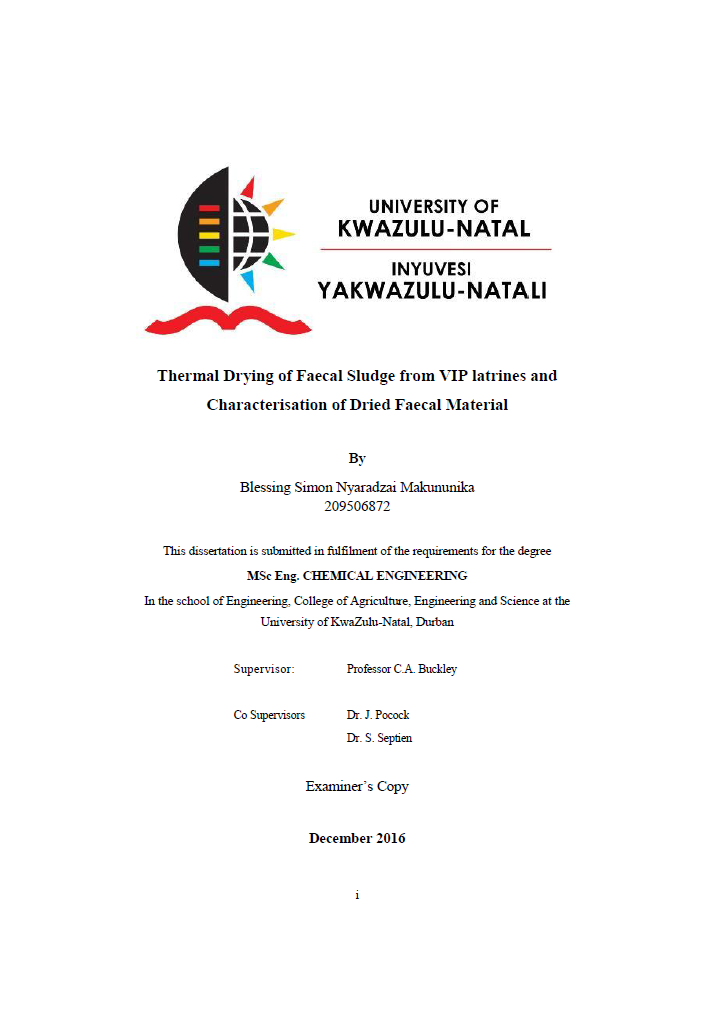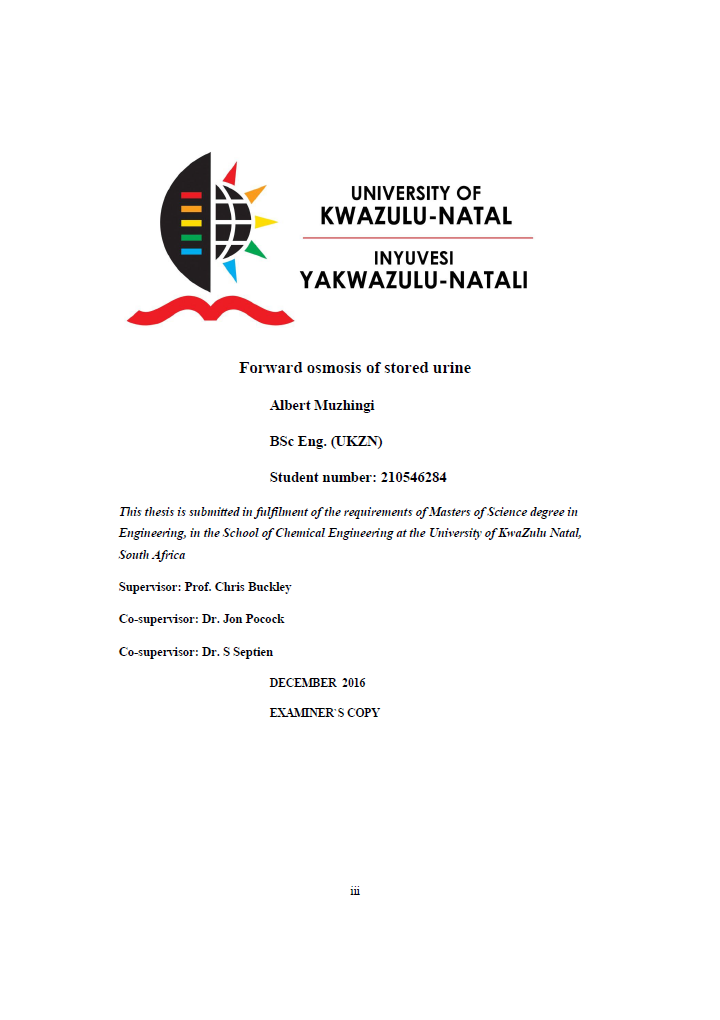Chowdhury Repon, AR., Omar, F., Mamtaz, R. (2015) Participation-Oriented Safety Training for the Faecal Sludge Emptiers Action Manual on Occupational Safety and Health
The broader objective of the Participation Oriented Safety Training (POST) manual is to support emptiers and employers involved in this field to improve their knowledge of occupational health and safety in both manual and mechanical operations. The present training manual aims to address the risks involved in faecal sludge handing and emptying operations through the implementation of participation based model. And to provide the skills […]
Dube, K. (2016) Modelling of the Thermophysical Properties of Hydrolysed Urine and its Concentrates Master thesis from the Pollution Research Group, at the University of KwaZulu-Natal (Durban, South Africa)
Ouma, J.A. (2016) Microfiltration/Ultrafiltration of stored Urine and Urine Diluted with Water Master thesis from the Pollution Research Group, at the University of KwaZulu-Natal (Durban, South Africa)
Horstman, D. (2016) Analysis and Experimental Exploration of a Nanofiltration membrane System, in the Context of Potential Urine Treatment Processes Master thesis from the Pollution Research Group, at the University of KwaZulu-Natal (Durban, South Africa)
Makununika, B.S.N (2016) Thermal Drying of Faecal Sludge from VIP latrines and Characterisation of Dried Faecal Material Master thesis from the Pollution Research Group, at the University of KwaZulu-Natal (Durban, South Africa)
Muzhingi, A. (2016) Forward osmosis of stored urine Master thesis from the Pollution Research Group, at the University of KwaZulu-Natal (Durban, South Africa)
Mangharam, A. (2017) SFD Lite Report - Madison, WI, USA
Madison is the capital of the state of Wisconsin and the county seat of Dane County, and is home to 252,551 people. Sometimes described as the City of Four Lakes, it comprises the four successive lakes of the Yahara River: Lake Mendota, Lake Monona, Lake Waubesa and Lake Kegonsa. According to the Madison Metropolitan Sewerage District, 100% of the population in Madison relies on separate […]
Mangharam, Anushka (2017) SFD Report - St. Louis, MO, USA
The City of St. Louis is located within the state of Missouri, USA. Built along the Mississippi River, it borders St. Louis County but is not a part of it. The Metropolitan St. Louis Sewer District (MSD) serves the City of St. Louis and 90% of St. Louis County, equivalent to a total of 1.3 million people. It is estimated that 90% of fecal sludge […]
Mangharam, Anushka (2017) SFD Report - Cape Cod, MA, USA
Cape Cod is a geographic cape extending into the Atlantic Ocean from mainland Massachusetts, USA. It has a population of 215,888 people, nearly doubling in the summer. The sanitation infrastructure in Cape Cod consists of both centralized wastewater systems leading to a publicly-owned wastewater treatment plant with effluent disposal, as well as decentralized wastewater systems. Date of production: 24/07/2017
Ahrens, B. (2005) A Comparison of Wash Area and Soak Pit Construction The Changing Nature of Urban, Rural, and Peri-Urban Linkages in Sikasso, Mali
In this report, the relationship between geographic location, project implementation process, and ten factors were analyzed. In the urban case study, major influential factors included the presence of aid money, education, and concentration of pollution. The greater part of the urban project is carried out by the policy makers, indicating a “topdown” approach to development. In the rural case study, the major influential factors were […]
Kengne, I., Diaz-A., B. M., Strande, L. (2014) Faecal Sludge Management Systems Approach for Implementation and Operation
The previous chapters covered how stabilisation, drying, and pathogen reduction of faecal sludge (FS) can be achieved with different treatment technologies, and combinations of these various technologies. Each treatment technology results in endproducts which need to be further treated, disposed of, or harnessed for some type of resource recovery. Endproducts, for example dried or partially dried sludge, compost, leachate, and biogas, each have an intrinsic […]
Deublein, D., Steinhauser, A. (2011) Biogas from Waste and Renewable Resources
The book includes detailed descriptions of all the process steps to be followed during the production of biogas, from the preparation of the suitable substrate to the use of biogas, the end product. Each individual stage is assessed and discussed in depth, taking the different aspects like application and potential into account. Biological, chemical, and engineering processes are detailed in the same way as apparatus, […]
Fulford, D. (1996) Biogas Stove Design A short course
This document aims at guiding how to design biogas stove.
Cointreau, S. (2004) Sanitary Landfill Design and Siting Criteria
For two decades, solid waste components in World Bank projects have focused on collection of solid wastes, with equipment provided to upgrade operations at existing open dumps. Since early 1990, the private sector has become increasingly being involved in the collection, disposal, and treatment of solid waste and World Bank projects have placed greater priority on implementation of new sanitary landfills. The following guidance provides […]
EPA (1994) A Plain English Guide to the EPA Part 503 Biosolids Rule
The purpose of this document is to explain the intent and requirements of the Part 503 rule and to assist owner/operators in determining the extent to which their biosolids management operation is covered. To help clarify the intent of the Part 503 rule! this guidance document sometimes uses terms that do not appear in the rule itself and organizes information differently from the rule. For […]
Jenkins, J. (2005) A Guide to Composting Human Manure
“Human waste” is a term that has traditionally been used to refer only to human excrements, namely fecal material and urine, which are by-products of the human digestive system. When discarded, these materials are colloquially known as human waste. When recycled for agricultural purposes, however, they’re known by various names, including night soil (when applied raw to fields in Asia) and human manure or humanure. […]
Adam-Bradford, A., Tomkins, M., Perkins, C., van Veenhuizen, R., Binego, L., Hunt, S., Belton, J. (2016) Transforming Land, Transforming Lives Greening Innovation and Urban Agriculture in the Context of Forced Displacement
Greening innovation and urban agriculture can bring dignity, empowerment and food sovereignty to refugee communities. Simple technologies and waste recovery make these techniques cost effective and adaptable. Both should be central to designing, implementing and sustaining both refugee camps and overcrowded urban areas. This report examines current and potential use of greening innovation and urban agriculture in refugee camps, cities and rural settlements in four […]
GIZ, UNICEF (2017) Water, Sanitation and Hygiene in Schools (WinS) International Learning Exchange (ILE)
The report summarizes the proceedings of the ILE in Indonesia, provides technical details and input of invited resource experts as well as participants, and expands on the key discussions that made the event such a lively, useful and practical experience for all participants. It is hoped that the report will be an important element in joint global knowledge management for WinS and that it will […]
Various authors (2016) WASH management for sustainable service delivery WASH Futures Conference, Presentations from Stream A: WASH management for sustainable service delivery
Accountability and shared governance Nozibele Mjoli Make or break: accountability central to good sanitation governance Prasetyastuti Puspowardoya Co-management: enabling community-based sanitation sustainability Nughroho Tri Utomo & Declan Hearne Social contracts: a tool for better governance of water services Justino da Silva Supporting communities in Timor-Leste to audit government water supply services Strengthening enabling environments Henry Northover How did the East Asian 'Tigers' deliver sanitation within a generation? Lessons for the SDGs Virak Chan Innovation and learning from behaviour […]
SOILS Publications (2016) An Illustrated Guide for Vegetable Micro-Gardens in Refugee Camps

